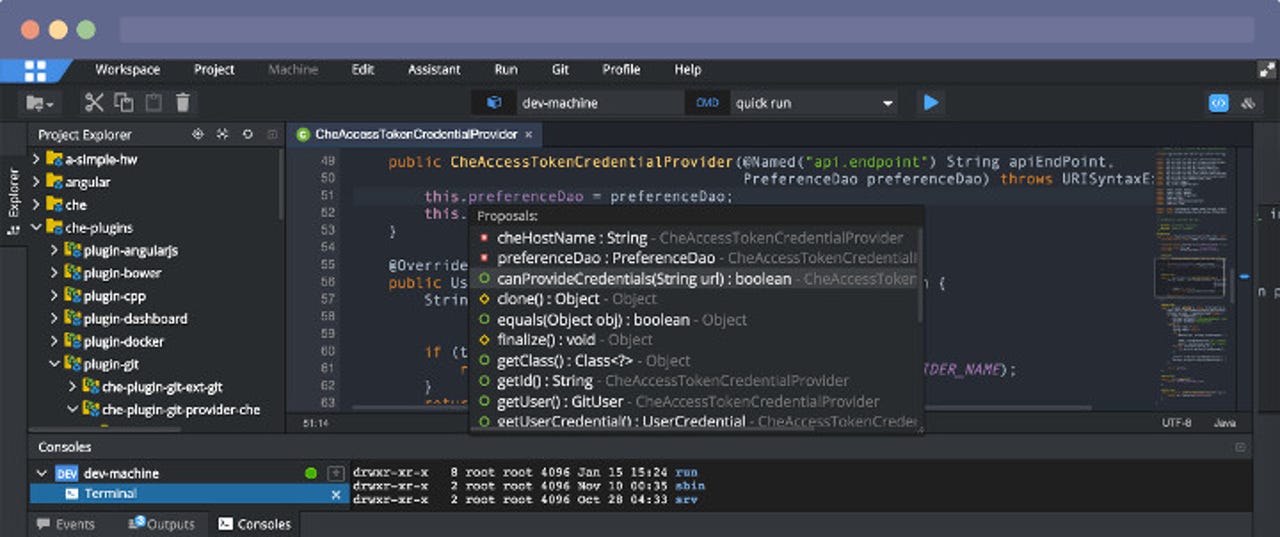Microsoft integrates Visual Studio with open-source Eclipse IDE

It won't get the headlines that Microsoft bringing SQL Server to Linux did, but Microsoft joining the Eclipse Foundation and integrating Visual Studio with Eclipse is just as big a deal for developers.

The new Eclipse will work with Microsoft's Visual Studio and vice-versa.
Eclipse is an extremely popular open-source Integrated Development Environment (IDE). While Eclipse is written in Java, since its beginning in 2001, Eclipse has gone far beyond Java. Today, developers use Eclipse for almost every language from Ada to Scheme Lisp.
Now Microsoft developers will be able to use it with Visual Studio as well. Today, Microsoft introduced the Azure Toolkit for Eclipse and Java Software Development Kit (SDK) for Azure enables Eclipse users to build cloud applications. With the free Team Explorer Everywhere plug-in, Eclipse developers will have full access to the full Visual Studio Team Services, including source control, team services, and DevOps capabilities from within Eclipse. These offerings will continue to be maintained and shared through the Eclipse Marketplace.
Microsoft is also contributing the following programs to the Eclipse project.
- We are open sourcing the Team Explorer Everywhere Plugin for Eclipse on GitHub today, so we can develop it together with the Eclipse community.
- Azure IoT Suite support in Kura. We will contribute an Azure IoT Hub Connector to Kura that will allow to easily connect gateways running Kura to Azure IoT Suite.
- Azure Java WebApp support in the Azure Toolkit for Eclipse, which makes it easy to take a Java web app and have it running in Azure within seconds
- A refreshed and updated Azure Java Dev Center
- With the Java Tools Challenge, we are inviting Java developers to build apps and extensions for Visual Studio Team System (VSTS).
Codenvy, the software development company, has helped bring Eclipse and Visual Studio together with its Visual Studio Team Services extension. This extension activates Codenvy workspaces on-demand from within Microsoft's tools, creating a streamlined workflow that aligns with agile methodologies and principles. The Azure VM Marketplace now includes a virtual machine preconfigured with Codenvy, so developers can instantly provision private Codenvy workspaces on Azure.
The Eclipse Foundation also announced the release of the latest version of Eclipse: Eclipse Che. Besides the usual suspects, Codenvy, Red Hat, and SAP, Microsoft also helped create Eclipse Che.
This Eclipse IDE also boasts the following new features:
- Collaborative Workspace Server. Host Eclipse Che as a workspace server, providing shared access to programming services to workspaces and teams. Workspace environments are given a hostname and accessible by remote clients.
- Cloud IDE. A no-installation browser IDE and IOE accessible from any local or remote device.
- Plug-In Framework. Che is extensible, by customizing built-in plug-ins or authoring your own extensions.
- Stacks. Build projects for any programming language and framework. Create runtimes from Che's image and stack library, pull from DockerHub, or author custom images with Dockerfiles.
Besides embracing Microsoft, this is not your dad's Eclipse. As Mike Milinkovich, the Eclipse Foundation's Executive Director, said in a statement, "Eclipse Che is rethinking the way IDEs are built and used by developers. It is using cloud and micro-service technologies to create a more flexible and dynamic developer work experience.
Curiously, Google, however, has moved away from Eclipse. Google decided to cease development and support for Android Developer Tools (ADT) in Eclipse by the end of 2015. It's replacing it with Google's own development environment, Android Studio.
This combination open-source cloud IDE, workspace server, and plug-in platform is available now. Eclipse Che's source code is available on GitHub.
Ready for the next generation of IDEs? Eclipse and Microsoft are.
Related Stories: